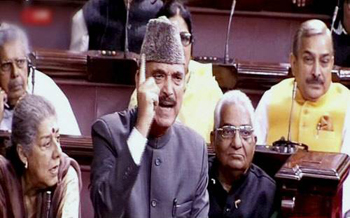New Delhi, Nov 18: Congress and BJP members today clashed in Rajya Sabha over Leader of Opposition Ghulam Nabi Azad's remarks during demonetisation debate yesterday, forcing adjournment of the House thrice in quick succession.
 Slogans and counter slogans forced the adjournment of the House first till 1130 hours, then till noon and again till 1233 hours as similar scenes continued.
Slogans and counter slogans forced the adjournment of the House first till 1130 hours, then till noon and again till 1233 hours as similar scenes continued.
Soon after listed papers were laid on the table of the House, BJP members moved into aisles shouting slogans and demanding an apology from Azad for his remarks comparing the deaths after demonetisation with those killed in terrorist attacks. The remarks were expunged by the Chair yesterday itself.
Congress members too rushed into the Well raising slogans demanding an apology from the Prime Minister and government for the hardship caused to the common man due to withdrawal of 86 per cent of the currency in circulation in the form of old 500 and 1000 rupee notes.
AIADMK members were also in the Well raising slogans over the Cauvery water issue. Deputy Chairman P J Kurien asked all members to leave the Well and return to their seats, assuring them that he would hear their submissions.
Amid the din, Minister of State for Parliamentary Affairs Mukhtar Abbas Naqvi alleged that Azad's statement had given a message to the country that Congress was sympathetic to terrorism and asked why was it so agitated when the demonetisation drive was only to hurt blackmoney hoarders.
The Chair persuaded AIADMK and Congress members to withdraw from the Well, telling them that he would give opportunity to their leaders to raise their respective issues.
But with BJP members continuing to stand in the aisles and raise slogans, Congress members too were back in the well shouting slogans.
Kurien said treasury benches should not create problems for the Chair. "If you do this, what do I do? You should cooperate with me in running the House. Treasury benches should not disrupt," he said.
But the din continued, forcing him to adjourn the proceedings till 1130 hours.There was no change in the scenario when the House reassembled as both BJP and Congress members again started raising slogans.
While Congress members trooped into the Well, several AIADMK members were seen standing along their seats. As the slogans and counter slogans continued, the Chair adjourned the House till noon.
When the House reassembled at noon, members from the Opposition again trooped into the Well demanding an "apology from the Prime Minister" for causing harrassment to the people. The BJP members were also on their feet countering the Opposition.
All pleas by Chairman Hamid Ansari to run the Question Hour proceedings failed to make any impact on the Congress and other members who were raising slogans.
As the heated exchanges between the Opposition and Treasury bench members continued, Ansari said "allow the Question Hour to run. What are you doing? Please go back to your seats."
As the uproar continued, the Chairman adjourned the House for 30 minutes till 1233 hours.
When the House reassembled at 1233 hours, it again witnessed uproarious scenes with opposition members trooping into the Well and those from the Treasury standing in the aisles demanding apology from Azad.
While members from Congress and others raised slogans like "Narendra Modi maafi maango (Narendra Modi apologise)," the Chairman tried to restore peace by repeatedly telling them, "go to your seats, you cannot do this."
However, as the uproar continued, Ansari adjourned the House within minutes for the fourth time till 1430 hours.
Earlier, the Chairman was heard saying "a minister can't do" as some ministers too were seen raising slogans. No business counld be transacted as the din continued unabated.
The list of business today included further discussion on demonetisation of currency. Two bills were listed for consideration and passing - the Human Immunodeficiency Virus and Acquired Immune Deficiency Syndrome (Prevention and Control) Bill, 2014 and the Employee's Compensation (Amendment) Bill 2016, which is to be followed by Private Members' Business.





Comments
Add new comment